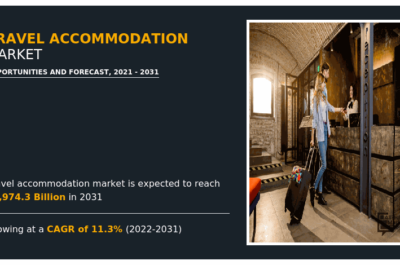Leisure travel segment accounted for nearly one-third of the global market and is expected to grow with the highest CAGR of 7.2% during the forecast period.
PORTLAND, OREGON, UNITED STATES – According to a new report published by Allied Market Research, titled, “Destination Management Service Market” The destination management service market was valued at $3.6 billion in 2022, and is estimated to reach $6.9 billion by 2032, growing at a CAGR of 6.8% from 2023 to 2032.
Destination management services involve a variety of professional services offered by DMOs or DMCs to enhance the travel experience. Moreover, owing to growth in awareness regarding environmental & social issues, sustainability and responsible tourism have become destination management service market trends. Travelers increasingly prioritize destinations and destination management service providers that embrace eco-friendly practices, support local communities, and promote sustainable tourism initiatives surge the destination management service market size. Destination management service companies are incorporating sustainability into their offerings, such as eco-tours, community-based excursions, and partnerships with local conservation projects.
DMOs/DMCs offer tailored experiences, handle logistics, promote the destination, and provide assistance & information to ensure a hustle-free & memorable visit. By utilizing their expertise & local connections, destination management service providers strive to optimize the tourist experience and leave a positive impression on travelers surge the destination management service market share.
With increase in awareness about environmental & social concerns, there is rise in demand for sustainable & responsible tourism. Travelers are now seeking experiences that have minimal impact on the environment, contribute to local communities, and preserve cultural heritage. DMOs can take advantage of this trend by integrating sustainable practices into their operations, promoting eco-friendly activities, and collaborating with local stakeholders to ensure responsible tourism.
Modern travelers are looking for tourism beyond traditional sightseeing. As a result, experiential travel, which emphasizes immersive & authentic experiences, is gaining popularity. Moreover, travelers are looking for opportunities to connect with local communities, take part in cultural activities, and acquire new skills. Destination management companies can cater to this trend by curating unique experiences such as culinary tours, artisan workshops, and cultural exchanges that enable visitors to develop a deeper connection with the destination, which results in destination management service market growth.
The travel industry is being transformed by technology and DMOs must adapt to this transformation to stay competitive. Mobile applications, artificial intelligence, data analytics, and VR can enhance the customer experience, streamline operations, and provide personalized services. For instance, mobile apps can offer real-time information, VR can provide virtual tours, and data analytics can assist in tailoring marketing campaigns. Embracing these technological advancements can give DMOs a competitive edge.

Niche tourism segments are experiencing significant growth as travelers seek more specialized experiences. Adventure tourism, wellness tourism, culinary tourism, and cultural tourism are among the popular niche segments. DMOs can seize this opportunity by developing targeted marketing strategies and creating customized itineraries that cater to these specific segments. By collaborating with local businesses & experts, they can curate unique experiences that resonate with niche travelers.
The integration of technology has revolutionized the market as destination management service providers are utilizing advanced digital tools to enhance their services and streamline operations. This includes online booking platforms, mobile apps for real-time information and communication, virtual tour experiences, and data analytics to gain insights into customer preferences and behaviors. Technology enables destination management service companies to offer efficient and convenient services while enhancing the overall customer experience.
Modern travelers are increasingly seeking experiential and adventure-based activities. Destination management service companies are capitalizing on this trend by offering a wide range of adventure tourism options such as hiking, biking, wildlife safaris, water sports, and immersive cultural experiences. They curate unique and thrilling experiences that allow travelers to connect with nature, explore local traditions, and create lasting memories. In addition to this, collaboration is a significant trend in the market. Destination management service providers are forming strategic partnerships with local tourism boards, hotels, transport operators, event organizers, and other stakeholders to create comprehensive travel packages. These collaborations allow for seamless coordination of services, access to exclusive experiences, and a broader network of resources, ultimately enhancing the value proposition for travelers.
DMOs can benefit from collaborating with local communities to encourage sustainable & authentic tourism. By involving local businesses, artisans, and community organizations, they can create opportunities for visitors to engage with the local culture, support local economies, and contribute to community development. This collaborative approach enhances the overall visitor experience and creates a positive impact on both the destination and its residents such factors surge the destination management service market demand.
The destination management service market analysis into service type, application, client type, and region. By service type, it is segmented into event management, accommodation booking, transportation logistics, and others. As per application, it is divided into corporate travel, leisure travel, adventure tourism, and others. On the basis of client type, it is segmented into event planners, individual, travel agencies, and others. Region wise, it is analyzed across North America (the U.S., Canada, and Mexico), Europe (Germany, UK, France, Italy, and rest of Europe), Asia-Pacific (China, Japan, South Korea, India, Australia, and rest of Asia-Pacific), and LAMEA (Brazil, Saudi Arabia, UAE, South Africa, and rest of LAMEA).
By type, the event management segment accounted for more than one-third of the market share in terms of revenue in 2022. Event management in the context of destination management services refers to the organization & execution of various events, such as conferences, meetings, exhibitions, festivals, and corporate gatherings, in a specific destination. Thus, rise of these events contributed to increase in demand for destination management services in the segment. Moreover, the accommodation booking segment is expected to grow with the highest CAGR of 7.3% during the forecast period. This is attributed to the fact that in recent years, there has been a noticeable trend of online accommodation booking in the market. Traditional methods such as contacting hotels directly or using travel agents have been largely replaced by online platforms and mobile apps.
Depending on application, the leisure travel segment led the market and accounted for nearly one-third of the global market in 2022 and is expected to grow with the highest CAGR of 7.2% during the forecast period. This growth is attributed to rise in trend toward experiential & immersive leisure travel. Travelers are now seeking personalized experiences that allow them to connect with the local culture, traditions, and natural beauty of a destination.
On the basis of client type, the event planner segment accounted for two-fifths of the global destination management services market share in 2022. This growth is attributed to the fact that trend of event planners as clients in the destination management services market is growing. As more businesses and organizations realize the benefits of hosting events in unique & attractive destinations, there is increase in demand for destination management services by event planners. Moreover, the individual segment is expected to grow with the highest CAGR of 7.3% during the forecast period. Thus, rise in number of independent travelers who seek personalized & tailored experiences, is anticipated to contribute to the segmental growth in the future years.
Region wise, North America was the largest market in 2022, accounting for nearly two-fifth of the total market share. In the North America destination management services market, there is a noticeable trend toward experiential & sustainable travel. Some of the key players in the North America market include AlliedPRA, Hello! Destination Management, and Global DMC Partners. Moreover, Asia-Pacific is expected to grow with the highest CAGR of 8.2% during the forecast period. Owing to rise in middle-class travelers, there is increase in demand for customized and experiential travel experiences. As a result, destination management service providers are focusing on promoting unique cultural encounters, adventure tourism, and sustainable practices.
The players in the destination management service industry have adopted acquisition, business expansion, partnership, collaboration, and product launch as their key development strategies to increase profitability and improve their position in the market.Some of the key players profiled in the market analysis include CSI DMC, LLC, 360 Destination Group, LLC, Global DMC Partners, DM Africa, Terra Events, Ovation Global DMC, IVI DMC Enterprises, PRA Events, Inc., Hello Destination Management, LLC and Hosts Destination Services, LLC.
Vicky is the co-founder of TravelDailyNews Media Network where she is the Editor-in Chief. She is also responsible for the daily operation and the financial policy. She holds a Bachelor's degree in Tourism Business Administration from the Technical University of Athens and a Master in Business Administration (MBA) from the University of Wales.
She has many years of both academic and industrial experience within the travel industry. She has written/edited numerous articles in various tourism magazines.


































































































































































































